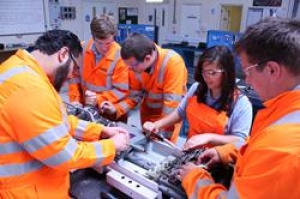Network Rail: School girls think engineering is a job for the boys

Many girls believe engineering is a job for boys, according to a survey of 12-17-year-olds published today by Network Rail. Engineering is second only to the construction industry in struggling to overcome the gender divide, the survey found.
Some 39 per cent of girls say certain jobs are more suited to boys. Of those, 40 per cent cited engineering, with 58 per cent naming building and construction. Finance was rated the third most “male” job (29 per cent).
The findings of the poll of 500 school-aged girls will underline concerns among employers that they are missing talent because of entrenched attitudes by both sexes. Network Rail is at the forefront of efforts to attract more women employees, with chief executive Mark Carne pledging a “war on the macho culture of the rail industry”.
Loraine Martins, director of diversity and inclusion at Network Rail said of the research, “It’s no secret that the engineering sector in particular is male dominated and trouble attracting talented women into its sector, and organisations like ours are making a concerted effort to change that. This research shows that even girls aged 12 are sensitive to stereotypes, and are ruling themselves out of particular jobs. We must put as much energy into tackling bias whilst girls are still in education, as we do into overcoming gender bias issues in the workplace.”
Network Rail has a 14% female workforce and has pledged to increase this with a three pronged approach to drive change within the organisation which includes:
ADVERTISEMENT
* Plans to attract more female graduates, so that 30% of the intake are female by 2019
* A strategy to retain more women by tackling deep rooted cultural issues and making the workplace more transparent and welcoming
* A strategy to support the career development of women already at Network Rail in achieving senior level positions – with CEO Mark Carne setting a target that 20% of its talent pool of future leaders will be female by 2019
This research explored the attitudes school age girls have about their career, and what influences them in their choice. It found that 65% of those surveyed already had a good idea of what sort of job they want to do, despite half of them being aged 13 or under. This suggests many have already ruled out of a career in engineering as they either think those kinds of roles are better suited to boys, or that they as a female ‘couldn’t do that sort of job’. Some 56% also admitted if they knew more about a particular career path they’d be more inclined to pursue a job in that area. Parents and teachers were cited as having the biggest influence on school age girls’ career choices.
Jane Simpson, interim director of safety, technical and engineering at Network Rail has first hand experience of gender bias which she also became aware of whilst she was still at school. “If my school career adviser had her way, I would have become a nursery nurse or teacher” she said. Instead Jane joined the engineering industry as an apprentice aged 16 and now manages a 500+ strongteam of mostly male engineers and technicians.
She said, “Now, I see myself as just another member of the team, but it wasn’t always that way. When I became the first female overhead line engineer on the railway in the 1990s, male colleagues were alarmed to say the least, and I experienced some really sexist attitudes. However, I’m really glad I went through it as I’m using that experience to help re-design our graduate recruitment strategy and replace unattractive images of men on track with messages and imagery that appeal to both sexes.”
In an additional commitment to encourage more women to consider and pursue a career in engineering, Network Rail have signed up to the Women in Science and Engineering (WISE) Ten Step Plan, and are supporting a number of university technical colleges across the country in attracting more women to engineering and technical degrees.
Loraine Martins concluded, “We know that our industry is perceived as being pretty macho and that men have a better chance of succeeding than women. If this is the general consensus among adults, then it’s hardly surprising that these attitudes appear to have rubbed off on younger generations. We cannot afford to be complacent and must keep challenging ourselves; setting ambitious targets to increase the proportion of women in our workforce and working with more education institutions to tackle the problem sooner and with the urgency it deserves.”

